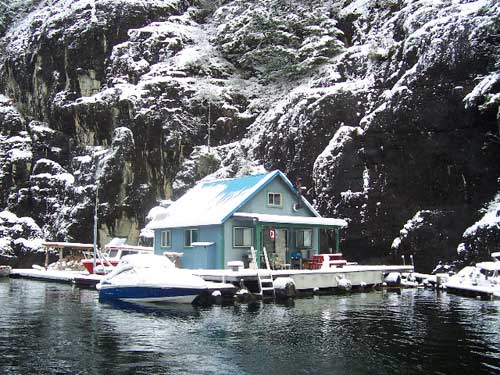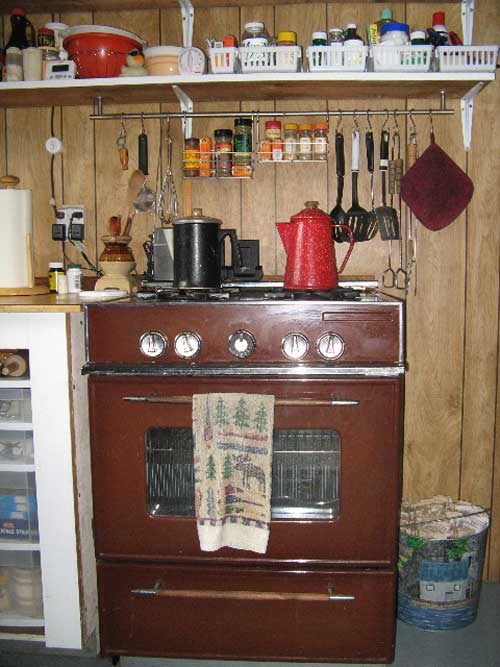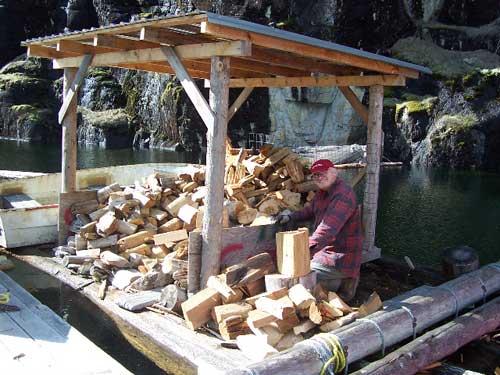
Lutz's Floating Cabin
by Margy Lutz, Powell River, BC
My husband Wayne and I were vacationing in Coastal British Columbia when we discovered something unique and intriguing on Powell Lake, float cabins. It was love at first sight. We had been looking for a place to retire and knew this was it. We laughingly say, when we bought our cabin, it came with John. This was very important. In the beginning we could only visit on holidays. John (the previous owner and cabin builder) agreed to check on our place and help out with odd jobs.
Float cabins are a big part of Coastal BC history. During the heyday of logging and fishing, they were used as support camps that could be moved from place to place. On Powell Lake, float cabins were inexpensive hunting and fishing getaways for paper mill workers. Today things are a little more regulated. Cabins have registered water leases and we pay property taxes.
Cabin construction begins with the float. John lashed huge cedar logs together with ¾ inch steel cable. A winch and hydraulic jack tighten the cables and large railroad spikes hold them in place. Next the deck is added and finally the cabin is built on top. John is typical of many people who live in Coastal BC. He is self-reliant and a “Jack of all trades.” And he has been very patient about teaching us “city-folk” along the way.

Cabin Foundation
Our cabin is small (20×21 feet) but complete. The downstairs has two bedrooms, one of which we use for storage and a bathtub. The main downstairs area is a great room design including kitchen, dining and living areas. The large upstairs loft is our bedroom. It’s plenty of space, especially since we have the whole outdoors at our doorstep. The main float is 40X40 and we have additional floats for a variety of purposes: a dock, a floating woodshed and my floating vegetable garden. The garden is on a pulley. I bring it in to tend my plants and then send it out to our log boom breakwater to protect it from hungry critters. When Wayne wants privacy for writing, he heads out to the Gemini, a renovated boat that is his author’s retreat.
Cabin Walls
We live up the lake about 25 minutes from the marina. Our power sources are solar and wind, with propane for cooking, refrigeration and additional lights. In winter we use a small generator to give our batteries an occasional boost. Our wood stove keeps the cabin warm so we can live there in all seasons. An outhouse on shore may soon be replaced with a composting toilet. Four flights of stairs up the cliff in stormy weather isn’t always fun.
Living Area and Stove
Now that we have retired, we spend about 75% of the year living in our float cabin. Our lives follow the seasons with wood gathering, gardening, swimming, fishing and enjoying our surroundings. There’s nothing better than getting up early and having a cup of coffee on the deck watching the sun rise over Goat Island to herald in a new day.
July Garden
In 2001 we purchased our cabin for $35,000 CAD which at the time was about $25,000 USD. We figured we couldn’t go wrong with that. Actually, because there is a moratorium on new cabins the values have risen quite rapidly. John sold another cabin this year (a little larger than ours) for $100,000 and some are going for even more than that. Even so, it is still within the range of many people. Of course, that is because there is no land involved. But we feel comfortable with our 20 year lease that is renewable from the BC government. The lease payment is $500 a year and the taxes the same amount.

Kitchen
When John built our cabin he installed a hand pump. It draws water from about six feet below the lake surface. To be safe, we boil it before drinking. Continue around the L-shaped counter and there is my small stove and oven. Open wall shelves hold our dishes and food. Under the counter are two plastic drawer units. To deter mice, we keep foodstuffs in containers, especially when we aren’t there. But we’ve been very lucky so far.
Pump
Tucked under the stairs to loft is a small refrigerator. It even has a freezer that really comes in handy during the summer for ice to make ice cream. Both the stove and refrigerator run on propane. Along with propane lights, a 60 lb. tank lasts about six weeks for $54. We have to haul the tanks to town in our boat, but once every six weeks isn’t too bad.
Refrigerator
I have to be honest. At the cabin, Wayne is first cook, especially when it comes to the barbecue. But I do have my specialties including cakes, breads and soups. This goes to show you don’t need a big fancy kitchen with lots of electrical appliances to make good food.

Cooking Stove
Especially this time of year, our wood-burning stove is the heart of our cabin. With occasional stovepipe cleanings, it keeps the fire roaring hot, or low and slow, depending on our need. I’ve even found a few creative ways to use it to back cakes and bread.
A wood stove must have wood. For us, that’s a fairly simple. Especially during high water, the wood floats right to our front porch. All we have to do is scoop it up, cut it up (sometimes) and let it dry. When we are gathering wood throughout the summer, we are dreaming of the cozy fires it will bring during long winter nights.
Wood Stove
Storing wood on our cabin’s float is problematic. We want it close by, but not weighing down the foundation for our cabin. Our floating woodshed and a small covered woodpile on our transition float to shore serve this purpose well. For those really rainy and windy nights, we have our small indoor wood shelf that holds about 5 days worth of really dry wood. It takes up a little space in our “guest room,” but no one seems to complain.
Wood Float
Wood storage shelf
We’ve added electrical power with solar panels and a wind generator, but use it sparingly. We have a few low powered lights in strategic locations and use it to run and recharge a variety of devices, including a satellite radio and laptop computers. We have cellular telephone reception with the help of a car antenna, but purposely have no television or Internet access. The easiest way to make a simple life complicated is with too much TV or web surfing. We get enough of that when we make weekly trips to town. Our cabin life on the water may be simple, but is perfect for us.

© All Right Reserved. Copyright © ÎÎÎ Èíôîðìàãåíòñòâî ÑÀ "Àðõèòåêòîð" ©
Ñâèäåòåëüñòâî î ðåãèñòðàöèè ÈÀ ¹ÔÑ1-02297 îò 30.01.2007
Óïðàâëåíèå Ôåäåðàëüíîé ñëóæáû ïî íàäçîðó çà ñîáëþäåíèåì çàêîíîäàòåëüñòâà â ñôåðå ìàññîâûõ êîììóíèêàöèé è îõðàíå êóëüòóðíîãî íàñëåäèÿ ïî Öåíòðàëüíîìó Ôåäåðàëüíîìó îêðóãó.

